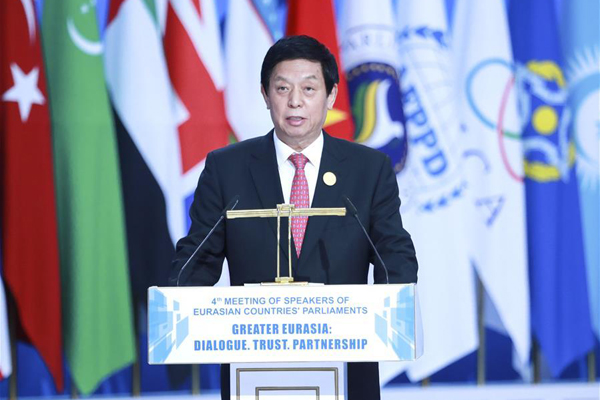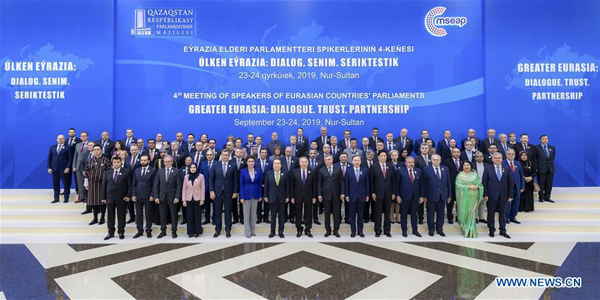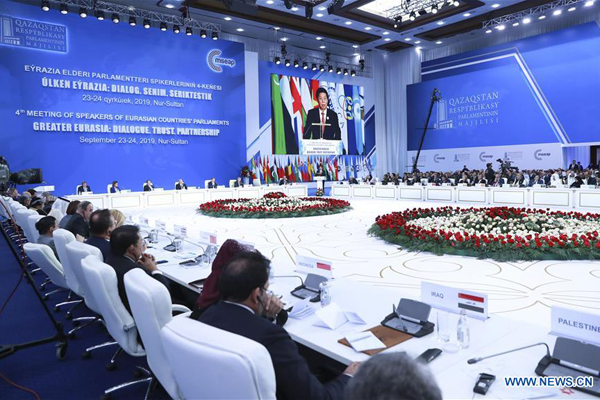China seeks closer cooperation with Eurasian countries -- top legislator

Li Zhanshu, chairman of the Standing Committee of the National People's Congress of China, delivers a keynote speech at the opening ceremony of the Fourth Meeting of Speakers of Eurasian Countries' Parliaments in Nur-Sultan, Kazakhstan, Sept. 24, 2019. (Xinhua/Zhai Jianlan)
NUR-SULTAN -- China supports common development for all countries and is ready to strengthen cooperation with Eurasian partners, top legislator Li Zhanshu said Tuesday.
Li, chairman of the Standing Committee of the National People's Congress of China, made the remarks when delivering a keynote speech at the opening ceremony of the Fourth Meeting of Speakers of Eurasian Countries' Parliaments (MSEAP) held in the Kazakh capital.
Li said that the world is undergoing profound changes unseen in a century. "Cooperation or confrontation? Openness or closing the door? Win-win progress or a zero-sum game? The interests of all countries and the destiny of mankind hinge on the choice we make," he said.
China has proposed the idea of building a community with a shared future for mankind, worked for a new type of international relations and contributed to promoting a fairer, more just and equitable global governance system, Li said, adding that the Belt and Road Initiative has created opportunities for the common development and prosperity of all participating countries.
Li said that Eurasia, the biggest landmass and the most populous continent on Earth, has the fastest development speed and the most promising future. The interests and future of Eurasian countries are closely interconnected.
He raised four-point proposals for Eurasian countries to enhance their ties.
Firstly, Li said Eurasian countries need to strengthen communication and consultation, respect each country's independent choice of development path, expand consensus and enhance political mutual trust.
Secondly, they should expand economic and trade ties and promote trade and investment liberalization and facilitation, in order to make the world economy more open, inclusive, balanced and beneficial for all, he said.
Thirdly, cooperation in such fields as culture, education, tourism, sports, media and youth should be strengthened to promote people-to-people exchanges among Eurasian countries.
What's more, he suggested that Eurasian countries strengthen communication between legislative bodies and implement important consensuses reached by leaders of the countries to help promote their relations.
Referring to the forthcoming 70th anniversary of the founding of the People's Republic of China, Li highlighted China's marvelous achievements in the past decades under the leadership of the Communist Party of China.
He underlined that China's development is a development featuring peace, cooperation and openness, adding that China has pursued development with its door open and actively participated in economic globalization while seeking no exclusionary blocs.
As a member of Eurasia, China regards countries on the continent as important partners, Li said.
China is willing to synergize the Belt and Road Initiative with the development strategies of Eurasian countries, as well as regional cooperation initiatives such as the Eurasian Economic Union, to promote all-round connectivity in this region and deliver more benefits to the people of Eurasian countries, he added.
This year's MSEAP, themed "Great Eurasia: Dialogue, Trust, Partnership," has gathered representatives from 65 countries and 14 international organizations, including more than 50 parliament speakers and vice speakers.

Li Zhanshu, chairman of the Standing Committee of the National People's Congress of China, poses for a group photo with other delegates during the Fourth Meeting of Speakers of Eurasian Countries' Parliaments in Nur-Sultan, Kazakhstan, Sept. 24, 2019. (Xinhua/Zhai Jianlan)

Li Zhanshu, chairman of the Standing Committee of the National People's Congress of China, delivers a keynote speech at the opening ceremony of the Fourth Meeting of Speakers of Eurasian Countries' Parliaments in Nur-Sultan, Kazakhstan, Sept. 24, 2019. (Xinhua/Pang Xinglei)
- Top legislature schedules standing committee session for late February
- China's top legislator meets with Uruguayan president
- Senior legislator surveys Anhui on formulating outline of provincial 15th Five-Year Plan
- China's top legislator meets with British PM
- NPC deputies see more engagement with top court



